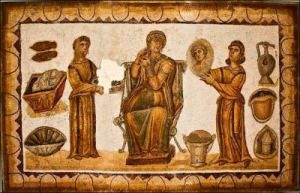Laws often trail practices, not the other way around.
In most slave-keeping societies the law didn’t mandate slavery, it just legitimated the practice. And while some people were in the market for slaves, no one wanted to be one. Even Aristotle said that some people in antiquity considered slavery unnatural. (See The Politics.)
In my last post on New Testament slavery I pointed out that slavery solved certain problems. There was the cheep labor problem, of course–but that’s only half the story. The other problem it solved was the displaced persons problem. What do you do with refuges or other people who’ve lost everything when you have no social services to speak of and you just don’t have the surplus capital to fund them even if you wanted to? Slavery was the answer most premodern societies came up with.
In those days you could avoid this unhappy fate if you knew the right people–but displaced people are lacking in connections. The adage, It’s not what you know, but who you know, has always been true.
Humans are dependent, rational creatures.
Our need to belong is as strong as it is because without other people we’re as good as dead. I think it was Aristotle, if I remember rightly, who said that a person who could live utterly alone would have to be either a god or a beast.
And because we need others, some people had to settle for slavery if that is the only alternative to exile. (Recall: Cain considered that to be a death sentence.)
When we think about this in relation to the spiritual life, in some sense slavery reflects our life without God, or better put, or lack of life in him.
The story of the Prodigal Son in Luke 15 is helpful. After the son has squandered his inheritance he’s smart enough to know that he can’t expect to find his old place in his father’s house just waiting for him. So he formulates a proposal, “Make me a hired servant.” He doesn’t go full-slavery, just wage-slavery, but you get the point. The son’s place will be determined by his father. And that’s the case for all of us when it comes to the heavenly Father.
Does God keep slaves?
Let me put it this way, is everyone an heir?
Every analogy breaks down if you expect too much of it. But spiritual slavery is definitely something you can read about in the New Testament.
We’re told that some people are slaves to sin. We’re told that other people are slaves to righteousness. There’s something compelling about sin, and there’s something else that is compelling about righteousness. But masters don’t all come equal. If you’re free to chose a master, chose the one who treats his servants well.
But the ideal in the Bible is to serve as a son, because ideally in a human household the bond that holds a son is a bond of love. And as a son serves his father he serves himself. That’s because he’s an heir. Everything that belongs to the father belongs to him.
Slaves could be adopted in many societies, and when that happened what the slave once did for nothing he now did as a son. On the surface it could look precisely the same. And yet, everything has changed. (Naturally I’m speaking of a small concern, not some large estate.)
So when we preach the New Testament household codes, we should keep these things in mind. Even when it comes to “slaves, obey your masters” there’s gospel hiding there if you have eyes to see it.













